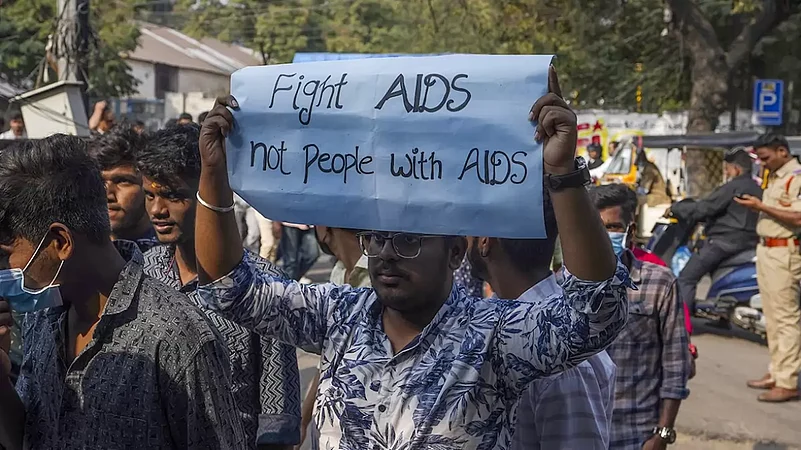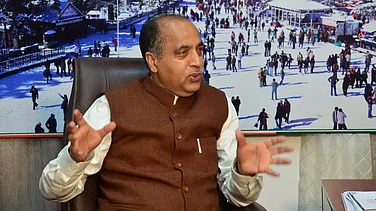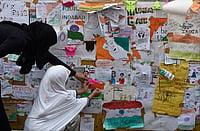My aunt took her husband to every hospital she could in Mathura town of Uttar Pradesh. But leave alone showing signs of improvement, my uncle’s health was declining every day. Over the phone, she explained everything to my father. My father thought it best to bring them to Delhi and see what could be done.
In the winter of 2007, when I saw him, for the first time I witnessed an adult being handled as if he was a new-born baby. The only thing off about him, however, was that, unlike a child’s body, his didn’t signal fragility but lifelessness. His limbs showed no sign of blood in them. Eyes, practically holes. Lips were dry, but they moved in an encrypted language that only my aunt could decode. Whenever they used to indulge in a conversation, I tried to imagine if this was the same couple I saw in a photograph I have of them. I still try to recollect if he was the same handsome man I saw when my memory was only beginning to shape up. But he neither appeared anything like that blurry figure of that man I had etched in my memory, nor he resembled that beautiful, smiling man in that photograph.
Along with him, even my aunt was increasingly looking sick. They were a different couple now.
When I overheard my father utter ‘HIV’, I didn’t understand what he meant but it did sound something like death. We children were in another room as we were denied entry to a room whenever its curtains were drawn — a sign of ‘private and serious’ discussion to us. When mother came into the kitchen, we asked her what has happened to the uncle. She said he’s fine; it’s just that he wants to go back to his home. Maybe he knew his end was near and thought it better to die in his birthplace, which he did.
In March 2007, at thirty-two, a mother of four teenagers, my aunt was bereft of even the final moment, the final touch of her love of life, who was taken away and buried in a jiffy by her in-laws — who did little to save his life and feed the children in the absence of their parents — to avoid spreading the disease while she lay unconscious.
Often, I wondered what killed him, and each time an array of options came to mind — poverty, inadequate healthcare, a life-threatening virus, and lack of information about its symptoms, prevention, and treatment, etc. But never ever did I think of ‘capitalism’ as one of the reasons.
A few days ago, I learnt that Cutter Laboratories, which was bought by pharmaceutical giant Bayer, “knowingly sold blood-clotting agents infected with HIV to Asia and Latin America”. They did so even “after introducing a safer alternative,” reported The Guardian, leading to the loss of hundreds and thousands of lives in Asia and Africa. My uncle could’ve been infected young by any of those blood products imported to India. Or as my aunt says that local hospitals don’t throw syringes after the designated single use, so it’s likely how it happened.
As a young adult, I saw HIV/AIDS as a crucial one-mark “expand the abbreviation” question in school examinations. It was only when I got access to the Internet in college that I googled everything I was curious about and had made a note in my diary that I realised how closely linked this word is to both my cishet and queer ancestors. I also came to know why AIDS is associated with the word Gay, and why a few people who came to our house to ‘see’ uncle never touched him. He was a spectacle for them. Also, somebody whom they could see die in front of their eyes. Like many did, comfortably and guiltlessly, in the 1990s when the AIDS crisis was at its peak.
One of the finest chroniclers of the paranoia of the time and of the personal and political was David Wojnarowicz, author of Close to the Knives: A Memoir of Disintegration. He was 37 when he died in 1992. In the essay, Do Not Doubt the Dangerousness of the 12-inch-tall Politician, he asks, holding the government and privileged people who’ve championed the art of unseeing, “Does the fact that one cares or does not care reflect a feeling or position of power?”
In an attempt to raise awareness about HIV/AIDS and socialise what their symptoms are and how they can be prevented, every year, the first of December is celebrated as World AIDS Day. Ever since its first observance in 1988, UNAIDS campaigns around a theme every year. This year’s is “equalise”. In the organisation’s own words, it’s a “call to action” and aims at increasing availability and access to HIV testing, prevention, and treatment. And, in particular, wishes to end the inherent inequalities that are prevalent worldwide by changing the attitude of people towards HIV-infected people.
According to a UNAIDS report, in 2021, the world over 1.5 million people were newly infected with HIV, 3.8 crores are living with HIV, and 6.5 lac have died of AIDS-related illness. Queer people form one of the most vulnerable populations, findings reveal. While the risk of contracting the virus among men who have sex with men is 28 times higher than adult men, it’s 14 times “higher for transgender women than adult women”. By “adult”, UNAIDS perhaps means a cis-het person.
Looking at these numbers and the language, I wonder what progress is being made against the set goals. Like David, I also have so many questions — from a position of personal loss and because of being queer: When will society learn to see its fault lines clearly? When will governments the world over realise that accessible healthcare is a fundamental right, and that stigmatisation on the grounds of one’s sexual identity is not only counterproductive but also dangerous? It convinces me that a world obsessed with living in and with binaries cannot be equalised. Every year, there will be a new theme, but the story shall be old. At least thirty years old.

























